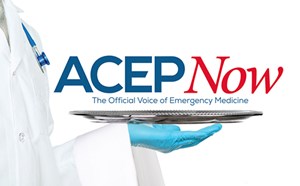The 21st Century Cures Act, a monumental law enacted in 2016, included numerous new requirements around the access, exchange, and use of patients’ electronic health information (EHI). The intent of the law is to prevent and eliminate wide-spread “information blocking”—the practice of withholding patients’ data or knowingly making it difficult or impossible to exchange data between electronic health record (EHR) systems. The Office of the National Coordinator (ONC) for Health Information Technology with the U.S. Department of Health and Human Services (HHS) issued a regulation implementing the information blocking provisions of the 21st Century Cures Act last year (ACEP’s comments on the proposed reg can be found here). In the reg, ONC describes in detail new requirements that health care practitioners, including you as emergency physicians, must take around data sharing.
While these new data sharing mandates were originally scheduled to go into effect last November, they were delayed until April 5 of this year due to COVID-19. When they do go into effect, all of you will be required to make your patients’ ePHI available for access, exchange, and use.
With April 5 just around the corner, I wanted to share some high-level information about the requirements and what they mean for you—and then provide you with some additional resources that you can review if you want to dig into the details.
What are the requirements and how will this impact me in the emergency department (ED)?
Starting April 5, patients must be able to access their data electronically – including lab data and clinician notes. Many patients already have digital access to their outpatient notes and most lab results within their EHR’s patient portal. However, patients will now be able to access ED and inpatient provider notes the same way.
Historically, the audience for ED charting was intended to be other clinicians or chart coders. Patients with EHR portal access will join that audience, and they may have questions or requests regarding their notes, particularly if they identify a potential error. Their feedback may be funneled to ED staff, who might be asked to edit their notes.
How will this note-sharing work?
Implementation will differ according to EHR vendors, individual clinics or institutions, state laws and regulations, and perhaps even local interpretation of the requirements. Many EHR vendors have the ability to make information, including patient notes, available to the patient via the patient portal as soon as they are signed, but may delay this to the end of the visit. Similarly, EHR vendors may be able to turn on note-sharing by default for the EDs but allow discretion in cases where you decide not to share the note. You should ask your hospital’s IT department or regulatory compliance team what system changes your EHR vendor is planning to make (or has already made).
What does ONC say about when information, including clinical notes, don’t have to be shared?
There are eight specific, rather complicated, information blocking exceptions in place that allow you to opt-out of sharing data in certain cases. You should review these carefully to see which may apply to you and your patients. One of these exceptions is for “preventing harm” – that is, a physician won’t be considered an information blocker if he or she engages in practices that are reasonable and necessary to prevent harm to a patient or another person, provided certain conditions are met. The exception is only attached to physical, not mental or emotional, harm. In addition, patients do not have a right to access their psychotherapy notes under the Health Insurance Portability and Accountability Act (HIPAA), so those don’t need to be supplied per the ONC reg.
Should your ED documentation habits change?
Your documentation habits may not need to change if you are already writing notes with the expectation that patients and family will read them and you are accurately and clearly describing in your notes what you discussed with the patient, and the factors that went into your medical decision making. This will help your patients understand their visit better and eliminate any potential confusion on their part or requests for modifications.
What are the penalties for non-compliance?
The short answer is that we don’t know yet what your or your institution’s penalties will be if you do not comply with the information-blocking requirements. The Office of the Inspector General (OIG) within HHS has yet to finalize specific penalties for different stakeholders (although for non-providers like EHR vendors, the penalties could be as high as $1 million), and ONC is still considering various options for providers. Even though most of you are exempt from the Promoting Interoperability category of the Merit-based Incentive Payment System (MIPS) since you are deemed “hospital-based providers,” there is currently a requirement within this MIPS category that you agree to the "prevention of information blocking."
Additional Resources
I know that these new requirements are complicated, but many of you probably work at hospitals or health systems that have IT and/or regulatory compliance departments that will actually be operationalizing them and incorporating changes into your EHR systems. If you do want to have a more solid grasp of the requirements and the eight information-blocking exceptions, there are excellent resources out there that may help answer any specific questions you may have.
First, there are numerous fact sheets and frequently asked questions on ONC’s website. The American Medical Association (AMA) has also put together two useful documents, one describing the information blocking requirements and exceptions and the other describing how you can begin to comply with the new requirements. Finally, from the ED perspective, there are two new ACEPNow articles out this week that I recommend you read:
- The Cures Act Gives Patients Access To Our Notes, & This Could Be Good
- Patients Will Soon Have Access To Clinical Notes—Are You Ready?
As these new requirements go into effect, I know that issues will come up that haven’t been addressed in any of these materials-- so please feel free to send me any questions you may have!
Until next week, this is Jeffrey saying, enjoy reading regs with your eggs.






